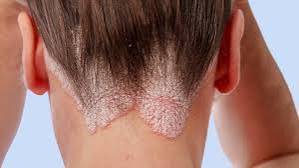Psoriasis
Psoriasis is a chronic autoimmune skin condition that accelerates the life cycle of skin cells, causing them to build up rapidly on the skin’s surface. This results in scaly patches, inflammation, and redness. Psoriasis can affect any part of the body, including the scalp, elbows, knees, and lower back.
---
Causes
The exact cause of psoriasis is not fully understood, but it is believed to involve a combination of genetic, immune, and environmental factors.
1. Immune System Dysfunction:
The immune system mistakenly attacks healthy skin cells, leading to rapid skin cell turnover and inflammation.
2. Genetics:
A family history of psoriasis increases the risk of developing the condition.
3. Triggers:
Stress: High stress levels can trigger or worsen psoriasis.
Infections: Streptococcal throat infections and other infections can lead to flare-ups.
Skin Injuries: Cuts, scrapes, or sunburns can cause new psoriasis lesions (Koebner phenomenon).
Medications: Beta-blockers, lithium, or antimalarial drugs can exacerbate symptoms.
Lifestyle Factors: Smoking, alcohol consumption, and obesity are associated with more severe symptoms.
---
Signs and Symptoms
1. Plaques:
Raised, red patches covered with silvery-white scales, commonly on the scalp, knees, elbows, and lower back.
2. Itching and Discomfort:
Affected areas may itch, burn, or feel sore.
3. Dry and Cracked Skin:
Skin may crack and bleed.
4. Thickened or Pitted Nails:
Nail changes, including pitting, discoloration, and separation from the nail bed, occur in some cases.
5. Joint Pain:
Psoriatic arthritis, which affects the joints, can develop in severe cases.
---
Effects
1. Physical Discomfort:
Severe itching, pain, and discomfort can interfere with daily activities.
2. Emotional and Psychological Impact:
Visible plaques and chronic symptoms may lead to embarrassment, anxiety, or depression.
3. Complications:
Increased risk of psoriatic arthritis, cardiovascular disease, and metabolic syndrome.
4. Impact on Quality of Life:
Difficulty with work, relationships, and social interactions due to visible symptoms.
---
Solutions and Treatments
Topical Treatments
1. Corticosteroids:
Reduce inflammation and itching.
2. Vitamin D Analogues:
Calcipotriol or calcitriol slows skin cell growth.
3. Coal Tar:
Reduces scaling, itching, and inflammation.
4. Salicylic Acid:
Helps remove scales and smooth the skin.
5. Moisturizers:
Hydrates the skin to reduce dryness and scaling.
---
Phototherapy
1. UVB Light Therapy:
Exposing skin to ultraviolet light helps slow skin cell growth.
2. PUVA Therapy:
Combines UVA light with a psoralen medication to improve effectiveness.
---
Systemic Medications (for severe cases)
1. Oral Medications:
Methotrexate: Reduces immune system activity.
Cyclosporine: Suppresses the immune response.
Acitretin: A retinoid that slows skin cell production.
2. Biologic Therapies:
Target specific parts of the immune system (e.g., TNF-alpha inhibitors, IL-17 inhibitors). Common options include adalimumab, etanercept, and secukinumab.
---
Lifestyle Changes and Home Remedies
1. Diet:
Anti-inflammatory diets rich in fruits, vegetables, whole grains, and omega-3 fatty acids may help.
2. Stress Management:
Yoga, meditation, and exercise can reduce stress-related flare-ups.
3. Avoid Triggers:
Identify and avoid specific triggers like infections, alcohol, or certain medications.
4. Regular Bathing:
Use lukewarm water and add Epsom salts or oatmeal to soothe the skin.
5. Quit Smoking and Limit Alcohol:
Smoking and excessive alcohol can worsen symptoms.
---
Preventive Measures
1. Regular Skincare:
Use gentle, fragrance-free products to avoid irritation.
2. Stay Hydrated:
Drink plenty of water and use moisturizers to maintain skin hydration.
3. Protect Skin:
Avoid harsh sun exposure and protect skin from injuries.
4. Monitor Triggers:
Keep a journal to identify and manage triggers.
---
When to See a Doctor
Symptoms are severe or widespread.
Joint pain or swelling occurs (possible psoriatic arthritis).
Over-the-counter treatments fail to control symptoms.
With proper treatment and lifestyle adjustments, psoriasis can be managed effectively, though it is a chronic condition that requires ongoing care.


